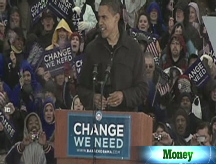Stocks suffer for 2nd day
Dow sheds 443 points, bringing its losses since Election Day to 929 points, as recession fears accelerate.
NEW YORK (CNNMoney.com) -- Stocks slumped for a second straight session Thursday, bringing the Dow's losses to 929 points since Election Day, as fears of a prolonged recession sent investors running for the exits.
The Dow Jones industrial average (INDU) lost around 443 points, or 4.9%. The two-session decline of 929 points, or 9.7%, marked the biggest two-session point loss ever and the biggest two-session percentage decline in 21 years, according to Dow Jones.
The Standard & Poor's 500 (SPX) index lost 5% and the Nasdaq composite (COMP) declined by 4.3%.
The Dow slumped 486 points Wednesday as President-elect Barack Obama's historic victory gave way to worries about the economy he inherits. Those same worries continued to drag on stocks Thursday.
"Everything is so dismal right now, It's just an endless flow of bad news and no one wants to buy," said Dave Rovelli, managing director of U.S. equity trading at Canaccord Adams.
Rovelli said that the steady stream of bad economic reports and weak corporate earnings and forecasts was taking its toll. In particular, the number of companies announcing layoffs was unnerving investors, especially ahead of Friday's big monthly jobs report.
October retail sales from the nation's chain stores were mostly abysmal, with some discounters such as Wal-Mart Stores escaping the fray. The housing market collapse, credit crunch and strained labor market have all taken their toll on consumers' wallets. Even the recent retreat in oil and gas prices has not had much of a positive impact on consumer spending.
"People are realizing that the recession is going to drag on until at least the end of 2009," said Rovelli.
Bear market: Stocks, as represented by the S&P 500, shot up 18% in the seven trading sessions through Election Day, bouncing off a 35% slump in the six weeks before. Since Tuesday, the S&P 500 has lost at least 8% of that.
The zigzagging reflects the volatility that has been present for months, but also an attempt at finding a bear market bottom. After such a run, analysts say Wall Street was vulnerable to a pullback.
"I think we're in a bottoming process," said Mark Travis, president and CEO at Intrepid Capital Funds. "But it's not going to be a V-shaped bottom where it bounces and goes straight up."
He said that stocks will likely continue to seesaw through year-end, unless some of the traditionally favorable seasonal patterns kick in. Stocks aren't likely to move higher until at least the second quarter of next year, as investors start anticipating an economic recovery six or nine months out.
During last week's rally, investors put money into equity mutual funds for the first time in 15 weeks, according to tracking firm Trim Tabs. The amount of money invested by equity mutual funds in the week ended Nov. 5 totaled $2.2 billion versus the $9.2 billion withdrawn during the previous week.
Company news: Among stock movers, automakers were hit especially hard on continued worries about their ability to stay afloat without government help. General Motors (GM, Fortune 500), a Dow component, slumped 13.7%. Ford Motor (F, Fortune 500) lost 5.3%.
On Wednesday, GM's North American president said that the industry is facing a critical 100-day period in which it needs to amp up its efforts to secure government support.
Cisco Systems (CSCO, Fortune 500) said late Wednesday that it has stopped hiring and that revenue for the current quarter won't meet forecasts. That overshadowed the company's better-than-expected earnings report. Shares fell 2.6% Thursday.
Las Vegas Sands (LVS) continued to plummet on worries that it may default on certain debt obligations and that it can't raise enough capital. The company operates the Venetian and Palazzo casinos and a pair of casinos in China.
Declines covered a variety of sectors, with all 30 Dow stocks falling, led by GM (GM, Fortune 500), Alcoa (AA, Fortune 500), American Express (AXP, Fortune 500), Citigroup (C, Fortune 500), General Electric (GE, Fortune 500), Intel (INTC, Fortune 500) and Boeing (BA, Fortune 500).
Market breadth was negative. On the New York Stock Exchange, decliners topped advancers by more than four to one on volume of 1.53 billion shares. On the Nasdaq, losers beat winners by almost three to one on volume of 2.43 billion shares.
Retail sales: With the exception of discount chain Wal-Mart (WMT, Fortune 500), most retailers saw October sales in line with the bruised economy. Thomson Reuters estimates the monthly sales could be the worst in eight years. (Full story)
Gap (GPS, Fortune 500) reported a 16% drop in sales at stores open a year or more, a retail industry metric known as same-store sales. Macy's (M, Fortune 500) same-store sales fell 6.3% and the company warned November sales would weaken.
AnnTaylor Stores (ANN) said same-store sales fell 19% from a year ago. The women's clothing retailer also said it was expanding its restructuring program and warned that third-quarter results won't meet forecasts. Shares fell 25.7%.
Signs of the recession were evident in economic reports released earlier this week. They included dour readings on manufacturing, factory orders and the services sector and the worst monthly auto sales in 25 years.
Jobs: The number of Americans filing new claims for unemployment last week topped forecasts.
The weekly number followed a pair of monthly reports Wednesday that showed the labor market continued to get hammered in October.
The reports were especially worrisome ahead of Friday's big government report. That report is expected to show that employers cut 200,000 jobs from their payrolls in October. Meanwhile, the unemployment rate, which is generated by a separate survey, is expected to rise to 6.3% from 6.1% the previous month.
Other markets: In global trade, Asian markets tumbled on recession fears. European markets also closed with big losses, after European and British central banks cut interest rates.
The dollar rallied against the euro and the pound after monetary policy makers in Europe cut interest rates in response to growing economic weakness. However, the greenback edged lower versus the Japanese yen.
COMEX gold for December delivery fell $10.20 to settle at $732.20 an ounce.
U.S. light crude oil for December delivery fell to a 19-month low, sinking $4.53 to settle at $60.77 a barrel on the New York Mercantile Exchange.
Gasoline prices fell another 2.5 cents to a national average of $2.34 a gallon, according to a survey of credit-card activity released Thursday by motorist group AAA. The decline marks the 50th consecutive day that prices have decreased. During that same time period, prices dropped by $1.51 a gallon, or 39.2%.
Lending rates: The credit market continued to improve. The 3-month Libor fell to 2.39% from 2.51% Wednesday, a nearly four-year low, according to Bloomberg.com. Overnight Libor rose slightly to 0.33%, bouncing off an all-time low of 0.32% the previous day. Libor is a key interbank lending rate.
The yield on the 3-month Treasury bill, seen as the safest place to put money in the short term, fell to 0.30% from 0.39% Wednesday, with investors preferring to take a small return on their money than risk the stock market. Last month, the 3-month yield reached a 68-year low around 0% as investor panic peaked.
Treasury prices were little changed, with the yield on the benchmark 10-year note at 3.70%.
Did you vote for Obama? How do you think the new president will affect your wallet? What do you think Obama needs to do to fix the economy - both in the short run and the long term? What should be first on the new Congress's agenda? E-mail us your thoughts, including your name, photo and contact info; the best answers will be featured in an upcoming CNNMoney.com article. ![]()




